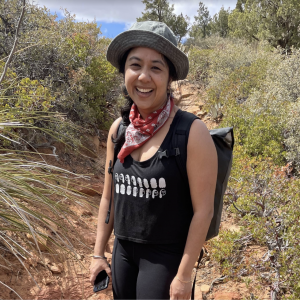As the climate crisis escalates, we see the convergence of gender and climate. Past IPCC reports have noted that those already most vulnerable and marginalized will experience the climate crisis first and worst. In particular, women across the world are experiencing the effects of the climate crisis more acutely than men. In fact, 70 percent of people living in poverty conditions are women. Women own less land and have less access to resources, decision-making, and environmental management support. As the IPCC notes, “Consequently, women are less able to confront climate change.”
Women are also on the frontlines of the climate fight, from Indigenous water protectors at Line 3 in Northern Minnesota to the Omkoi, Thailand community fighting to stop a dangerous coal mine. We’re proud to work with so many women who are leading the effort to protect their homes, communities, and environment. March is Women’s History Month and to celebrate we talked to some of the women at EarthRights who are fighting for human rights and environmental justice.
Interested in learning more about our work supporting those on the frontlines of climate justice? See more here.

Chantawarang (Aof) Prayadphol
Human Resources Coordinator, EarthRights Mekong Regional Office
What inspired you to fight for climate justice?
When I was young, I learned about “the greenhouse effect” then “global warming” but I did not completely understand. I watched the documentary film “An Inconvenient Truth”, and it is one of my concrete inspirations to fight for climate justice, which makes me concerned about living with nature, and what/how much we can do for our earth.
The idea of adaptation and resilience in response to climate change has been widely discussed recently. What do you think the government can do to increase resilience and address a climate crisis that is already here?
From my angle, the government should not pick only one process or one idea in response to a climate crisis. Because our impact on nature affects all parts of the ecosystem, we cannot heal in only some parts, but it should be done as a holistic or an integrated approach.
The government, which has authority, should take action in a prompt response. This includes creating campaigns on various types of issues, such as forest restoration, increasing green space/green building, reducing plastic, decreasing burning season, and more. This should be arranged by the government or in cooperation with other network organizations who are experts in each issue.
Educating people to understand, realize, and lead to action in response to the climate crisis is important too. In the meantime, the government should start to establish and/or develop environmental law by participating from all factors/levels of stakeholders to limit any further violations in the long-term.

Gabriela Valentín Díaz
Bertha Justice Fellow, EarthRights Washington, D.C. office
What inspired you to fight for climate justice?
I am inspired to fight for climate justice by my ancestors, my home, and its people. Being from Puerto Rico, my family and I have seen the devastating impacts of the climate crisis, the consequences of inaction, and the various ways intersecting identities interact with those consequences. Growing up and seeing these manifest in different, yet related, ways all over the world called me to this career and inspires me daily.
The idea of adaptation and resilience in response to climate change has been widely discussed recently. What do you think the government can do to increase resilience and address a climate crisis that is already here?
Governments must invest in climate-adaptive infrastructure. This means rethinking all our systems– social, economic, and physical, to protect the communities most vulnerable to the climate crisis and respond to the shifting climate. However, the most immediate action governments must take is de-incentivizing corporate profit, which is always increasing at the expense of our living environment. Government policies and subsidies encourage climate exploitative practices. A shift in this approach is critical to addressing the climate crisis. The time is now.

Shalini Nataraj
EarthRights Board Member, San Jose, CA, Ing Foundation
What inspired you to fight for climate justice?
The fact that communities/individuals who are already in critically vulnerable situations (those facing economic and natural devastation, refugees, Indigenous communities, those experiencing conflict, and, specifically, disadvantaged women) are the ones who are most negatively impacted by climate change has motivated me to fight for conditions to prevent and mitigate further harm due to climate change.
The idea of adaptation and resilience in response to climate change has been widely discussed recently. What do you think the government can do to increase resilience and address a climate crisis that is already here?
First, governments and any entities working to address climate change must put affected communities at the center of policies. Indigenous people, fishing communities, small farmers, women experiencing poverty need to be involved in the process when policies for adaptation and mitigation are being formulated. Governments must prioritize the preservation of key ecosystems such as the Amazon forests while ensuring that communities that depend on these resources are able to access other resources or sustainably use the resources they are already using. Fossil fuels need to remain in the earth, and green alternatives should quickly be brought into widespread use. Governments should share green technologies with lesser developed countries to help them leapfrog into fossil fuel-free futures.

Maya Sikand
Bertha Justice Fellow, EarthRights Washington, DC office
What inspired you to fight for climate justice?
I grew up in Kenya, a country on the frontlines of the climate crisis. We experienced devastating drought one year, flooding the next. Growing up I was aware of the growing environmental and climate crisis around me and the effect it had on the people struggling the most. Even as a young person, I felt a huge amount of urgency and outrage. This led me to become involved in youth climate organizing as a teenager and I’ve been on this path ever since.
The idea of adaptation and resilience in response to climate change has been widely discussed recently. What do you think the government can do to increase resilience and address a climate crisis that is already here?
The climate crisis was what brought me to this work. However, I am increasingly convinced that the climate crisis is not the problem itself, but actually a very devastating symptom of a larger set of problems: racial capitalism and settler colonialism. These are massive systems to tackle, but for a start, I think governments need to tax corporations to fund a universal basic income. You can’t face the climate crisis without addressing racial capitalism and settler colonialism. We need to address the fundamental systems of oppression and ensure people aren’t struggling to survive.






